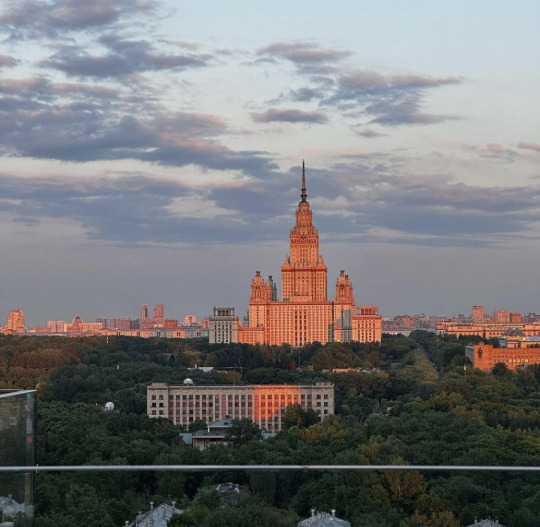#moscow state university
Text

Duel, 1963, from the series “Moscow State University” - by Vsevolod Tarasevich (1919 - 1998), Russian
132 notes
·
View notes
Text

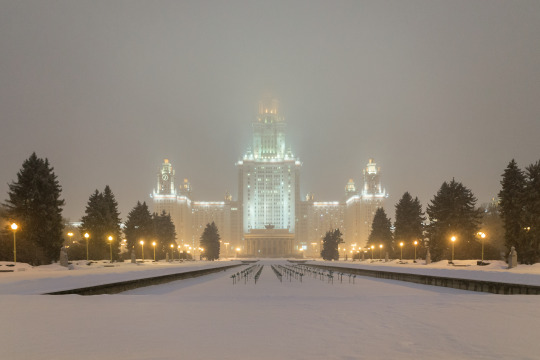
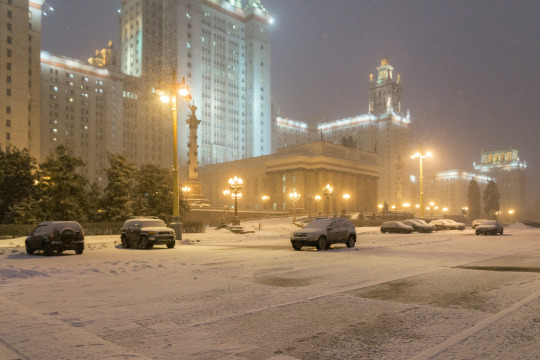

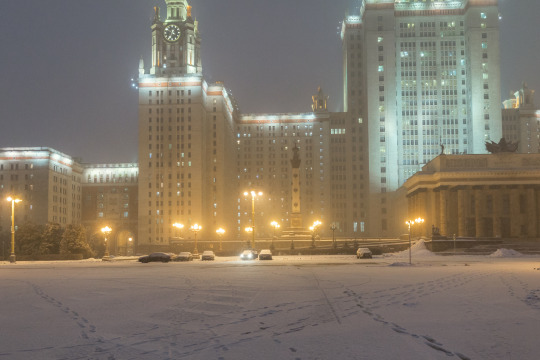
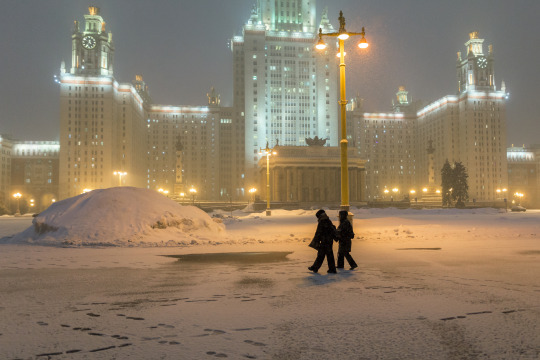
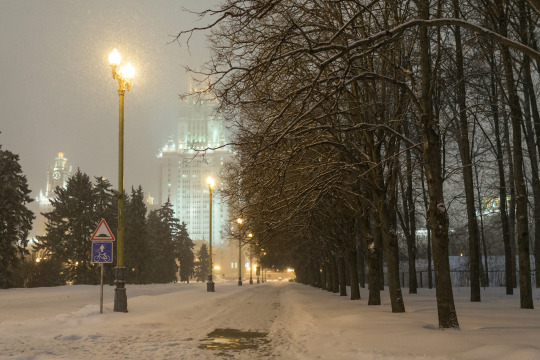
242 notes
·
View notes
Photo

“ acer japonicum in autumn “ // yoksel
166 notes
·
View notes
Text
In Russia you can end up behind bars for your wifi name.
A student has been sentenced to 10 days in jail in Moscow after renaming his wi-fi network with a pro-Kyiv slogan.
The Moscow State University student had titled the network "Slava Ukraini!" which means "Glory to Ukraine!".
A Moscow court found him guilty of displaying "symbols of extremist organisations" on Thursday.
Since the start of Russia's war in Ukraine, thousands have been handed prison terms or fines for criticising the invasion or supporting Ukraine.
The student was arrested on Wednesday morning in Moscow, after a police officer had reported the network name to authorities.
According to court documents, officers inspected his room within the university's student accommodation, and found his personal computer and a wi-fi router.
The court said he had used the network to "promote the slogan 'Slava Ukraini!' to an unlimited number of users within wi-fi range." The router has now been confiscated.
"Slava Ukraini" has become a rallying cry for supporters of Ukraine, and is regularly heard chanted during protests against Russia's full-scale invasion, which it launched on 24 February, 2022.
The student was found guilty of "public demonstration of Nazi symbolism... or symbols of extremist organisations". Russian President Vladimir Putin has repeatedly made baseless claims about a "neo-Nazi regime" in Ukraine, and used it to justify his invasion.
The student is the latest in a long list of ordinary Russians who have been punished for their comments - or actions - about the war.
Yes, Putin's totalitarian state even has agents checking wifi names for the slightest hint of opposition to the régime. That's how insecure Putin feels.
For our readers in Russia, here are some other wifi names you could substitute for the apparently offensive Slava Ukraini [Слава Украине/Слава Україні].
Ура трёхдневной спецоперации! [Hurray for the 3-day special operation!]
диктаторы злые [dictators are evil]
СССР – мертв. Смирись с этим. [The USSR is dead. Get over it.]
Путин хуйло [Putin's a dickhead]
Путин – иди на хуй! [Putin – go fuck yourself!]
Зеленский круче Путина [Zelenskyy is cooler than Putin]
You might get away with #1 if they don't understand that you're being sarcastic about Putin's war nearing Day 750. #2 is risky but if they do arrest you then you could accuse them of implying that Putin is a dictator. #3 is tempting fate because Putin considers the collapse of the USSR to be the greatest catastrophe of the 20th century. #4 and #5 are only worth trying if you want to end up in Navalny's old cell in an Arctic gulag. #6 would keep you in that gulag until the return of Halley's Comet.
If you live outside Russia but have a home or workplace near pro-Putin Russians or a Russian diplomatic office, it would be great fun to use some of those there.
#invasion of ukraine#wifi#wifi name#slava ukraini#moscow state university#repression#totalitarianism#vladimir putin#россия#московский государственный университет#вай-фай#россия - террористическая страна#диктатура#владимир путин#путин хуйло#путина в гаагу!#путлер#добей путина#путин параноик#путин – это лжедмитрий iv а не пётр великий#союз постсоветских клептократических ватников#руки прочь от украины!#геть з україни#вторгнення оркостану в україну#деокупація#слава україні!#героям слава!
6 notes
·
View notes
Text

source: bishopsbox
Moscow State University. I love this building.
2 notes
·
View notes
Text
Blessed Are the (Un)Happy
View this post on Instagram A post shared by Maria Pevchikh (@maria_pevchikh)
I was at an interview on TV Rain last week. We were supposedly going to discuss the Oscars, but suddenly we touched on what is an important topic, I think — how to behave appropriately during the war and amid everything else that is happening now.
I often read comments about how I smile all the time, but there is a…

View On WordPress
#Alexander Dugin#Alexei Navalny#Anti-Corruption Foundation#corruption#happiness#London School of Economics#Londongrad#Maria Pevchikh#Moscow State University#Roman Abramovich#Russian soft power#Sermon on the Mount#solitary confinement#Yuri Dud
0 notes
Text
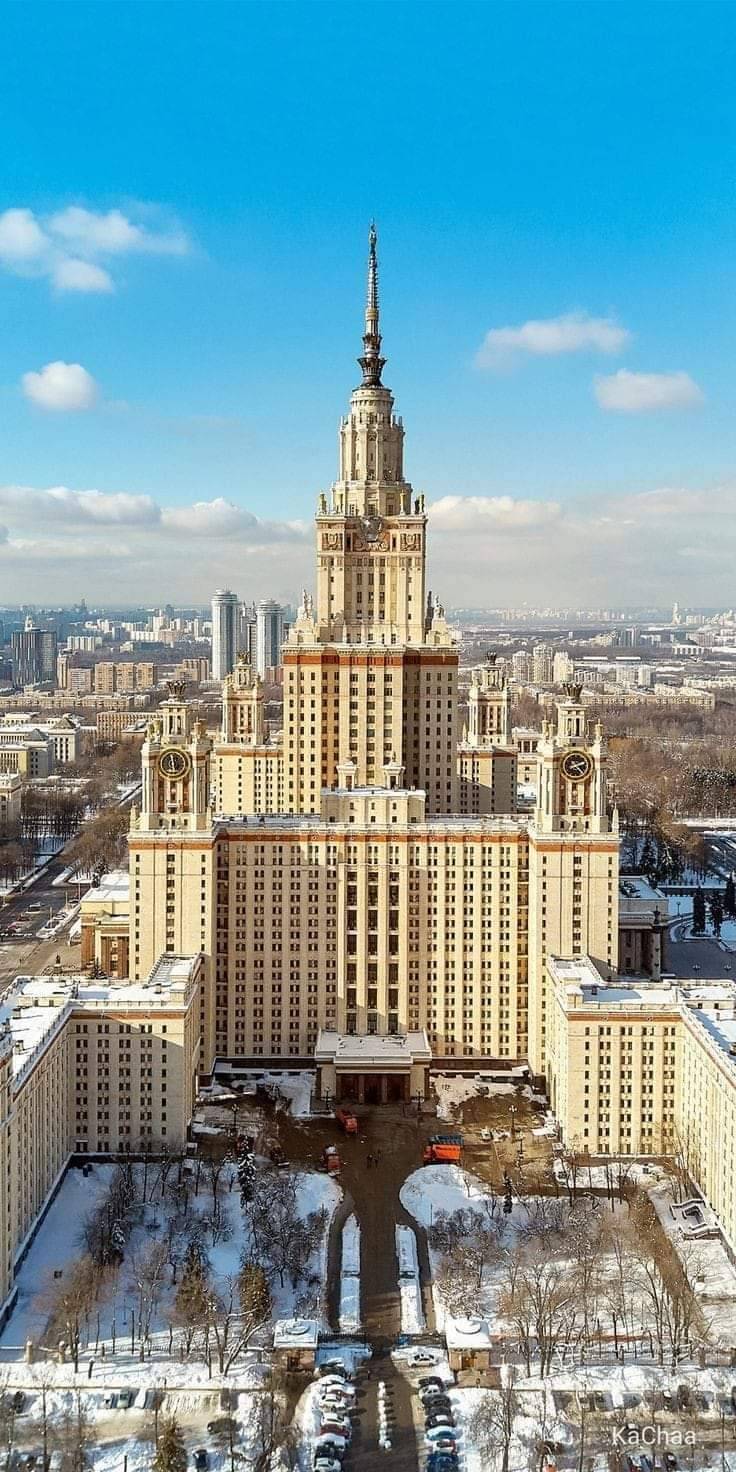
MOSCOW STATE UNIVERSITY
158 notes
·
View notes
Text
sitting in the library muttering "I'm such a good linguist I'm such a good linguist" to myself as I cry my way through the course organiser's hellscape conlang puzzle
6 notes
·
View notes
Text

Dive into the prestigious realm of medical education at the First Moscow State Medical University, where innovation meets tradition. Established in 1758, it stands as Russia's foremost institution for medical studies, renowned globally for its exceptional faculty, cutting-edge research, and commitment to producing top-tier healthcare professionals. Immerse yourself in a dynamic learning environment enriched by state-of-the-art facilities and a comprehensive curriculum designed to cultivate both theoretical knowledge and practical skills. Whether pursuing undergraduate, graduate, or postgraduate studies, students benefit from a holistic approach to medical education that emphasizes critical thinking, hands-on experience, and ethical practice. Join a vibrant community of scholars and practitioners dedicated to advancing healthcare and shaping the future of medicine. Explore endless opportunities for personal and professional growth while contributing to the ongoing legacy of excellence at the First Moscow State Medical University.
#first moscow state medical university#im sechenov moscow medical university#moscow state medical university
0 notes
Text
Sechenov Moscow Medical University, located in the heart of Russia's capital, stands as a beacon of medical excellence. Its rich history, dating back to 1758, is marked by a commitment to pioneering research and education. Renowned for producing skilled healthcare professionals, Sechenov University blends tradition with innovation.
With a diverse student body and world-class faculty, Sechenov fosters an environment where aspiring medical professionals can thrive. Cutting-edge facilities and a comprehensive curriculum ensure students receive a holistic education, preparing them for the challenges of the ever-evolving healthcare landscape.
Embracing a global perspective, Sechenov encourages international collaboration and exchange programs. This internationalization enhances the university's reputation and enriches the learning experience for all. As a proud part of Sechenov Moscow Medical University, students embark on a journey that not only shapes their careers but also contributes to the advancement of medical science on a global scale.
#first moscow state medical university#moscow state medical university#im sechenov moscow medical university
0 notes
Text
World: A Growing BRICS Bloc Shows U.S. Is Losing the Battle for the Global South
— BY Tom O'Connor | August 22, 2023
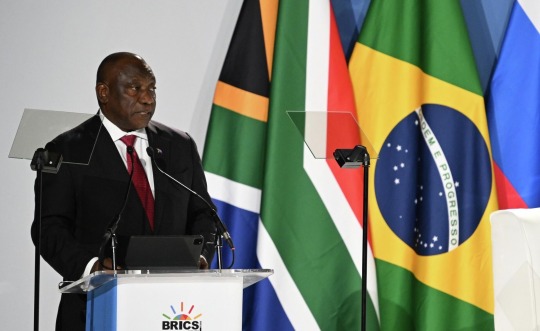
South African President Cyril Ramaphosa Delivers a Speech at the 15th BRICS Summit in Johannesburg, South Africa. © Sputnik/Grigory Sysoev/Go to the Mediabank
While Russian President Vladimir Putin's in-person absence due to international legal troubles looms over the BRICS conference attended by the leaders of fellow member states Brazil, India, China and South Africa, the growing interest in expanding the group to include additional countries from across the globe is likely to cement the bloc's future as a force in global geopolitics.
And with no seat at the table for the United States, the three-day summit that began Tuesday in Johannesburg demonstrates how Washington has struggled to project influence throughout the vast, developing Global South.
"The U.S. is trailing countries such as Russia, India and China in the Global South," Akhil Ramesh, a senior fellow at the Hawaii-based Pacific Forum, told Newsweek. "The Global South does not have this special solidarity it has with nations such as China and India. As victims of Western imperialism/colonialism and having faced similar challenges in reconstruction and development, they have a unique solidarity."
"The U.S. approach continues to be one where they use nations of the Global South as pawns in their future, larger cold/hot conflict with China or Russia," Ramesh added. "This understandably has not helped them win friends."
Such solidarity continues to extend to Putin, who has accelerated his country's outreach to developing nations, especially in Africa, in recent years.
Moscow's overtures have been met with ongoing interest, as evidenced by the recent Russia-Africa Summit in Saint Petersburg. The summit was attended by 16 African heads of state and representatives of 25 additional African countries, even as the West has accused Putin of war crimes, resulting in an International Criminal Court warrant, and of weaponizing food by bombing grain infrastructure and allowing a deal that safeguarded the continued export of Ukrainian grains via the Black Sea to collapse.
U.S. warnings about forging closer economic ties with China have been met with even stiffer resistance, as President Xi Jinping presses on with his ambitious Belt and Road Initiative extending across continents despite a slowing economy at home.
Ramesh argued that nations of the Global South simply "do not view Beijing and Moscow the same way the West does," and instead see new opportunities where traditional mechanisms have failed.
"So, when there was a group presenting an alternative to the Western-led world order/vision of the world," he added, "nations were quick to jump on the bandwagon."
Newsweek has reached out to the U.S. State Department for comment.
Still, obstacles to progress exist within a bloc whose core members already have little alignment in their broader geopolitical goals, while some, especially China and India, have active disputes between them. Such feuds have the potential to only grow as the coalition considers taking on new members, such as Iran and Saudi Arabia.
Others who have applied include Algeria 🇩🇿, Argentina 🇦🇷, Bahrain 🇧🇭, Bangladesh 🇧🇩, Belarus 🇧🇾, Bolivia 🇧🇴, Cuba 🇨🇺, Egypt 🇪🇬, Ethiopia 🇪🇹, Honduras 🇭🇳, Indonesia 🇮🇩, Kazakhstan 🇰🇿, Kuwait 🇰🇼, Morocco 🇲🇦, Nigeria 🇳🇬, the Palestinian National Authority 🇵🇸, Senegal 🇸🇳, Thailand 🇹🇭, the United Arab Emirates 🇦🇪, Venezuela 🇻🇪 and Vietnam 🇻🇳, according to the most recent count offered last week by South African Foreign Minister Naledi Pandor.
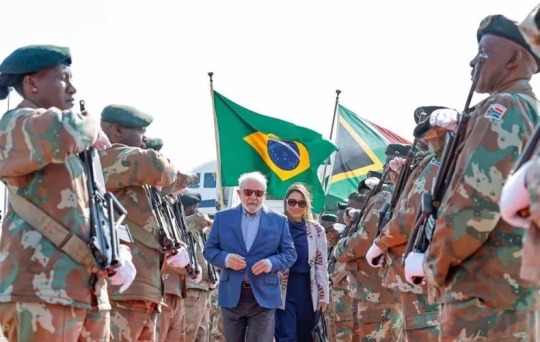
Brazil, Lula, arrives, BRICS, summit, South, Africa! Brazilian President Luiz Inácio Lula da Silva arrives in Johannesburg, South Africa ahead of the 15th BRICS summit. The leaders of 67 countries have been invited to join the forum led by Brazil, Russia, India, China and South Africa. Ricardo Stuckert/Presidency of The Federative Republic of Brazil
"Those who are there for the day-to-day negotiations, at least from the Brazilian government side, say it is already very hard to come to consensus when you have China, India and Russia at the table," Ana Elisa Saggioro Garcia, a professor at the Pontifical Catholic University of Rio de Janeiro's Institute of International Relations and general coordinator of the BRICS Policy Center, told Newsweek.
But "there's another side of the story," she said. That's the growing view, including from Brazilian President Luiz Inácio Lula da Silva, that "a strong BRICS" is necessary, and a "strong BRICS is also a big BRICS."
South Africa, the current chair, is the only nation to have been added to what began as an informal BRIC bloc, born out of a term coined by then-Goldman Sachs chief economist Jim O'Neill in 2001 to describe emerging economic powers. Russia led the initiative to bring Brazil, China and India together for the first summit in 2009, and South Africa was admitted the following year.
Initially, BRICS was focused on effecting reform within existing, primarily Western-led economic institutions, such as the International Monetary Fund (IMF), in the wake of the 2008 global financial crisis.
"The first common agenda that they had, despite their differences, was the reform of the international financial architecture," Garcia said. "So, international financial institutions, those grounded in the Bretton Woods Conference, in the post-war period, they do not represent the world anymore. Those huge economies don't have enough voice in those institutions, they need to be reformed. They need to reflect the new configuration of the world economic power."
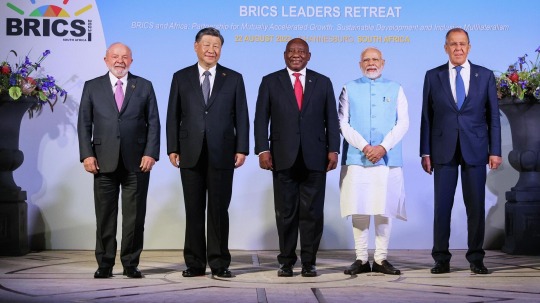
© Russian Ministry of Foreign Affairs/Go to the Mediabank
Gradually, the group became more focused on creating alternative mechanisms, most notably in the establishment in 2014 of the Shanghai-based New Development Bank, which today also counts Bangladesh, Egypt and the United Arab Emirates as members. With this transformation, Garcia explained, "the geopolitical character of BRICS started to be more important and more relevant than only the economic one."
China, in particular, she argued, "has been very clever and very strategic to use this opportunity to advance and to expand another coalition where China is predominant, where China doesn't have to deal with negotiations with Western powers."
But as evidenced by Brazil's enthusiasm for a more active role for BRICS and the growing list of prospective members, it's not all about Beijing.
"BRICS has become this pole of attraction of all countries now who've seen that they can have more power if they ally with a coalition such as BRICS to face measures that the West has been doing for years now," Garcia said, "and also to face these sorts of constraints and repression in terms of worldview and values."
Ryan Berg, director of the Center for Strategic and International Studies' (CSIS) Americas Program in Washington, D.C., also discussed how countries like Brazil were becoming more interested in the geopolitical nature of BRICS as an exercise in "active nonalignment."
"It can heighten the relevance of a country like Brazil, which is sometimes overlooked and feels overlooked and neglected," Berg said in response to Newsweek's question during a CSIS call held in the leadup to the BRICS summit.
"By pursuing this strategy," he explained, "you can basically make it a competition for the affection or for the attention of major world powers or leading world powers that would otherwise overlook Brazil's position on a particular issue."
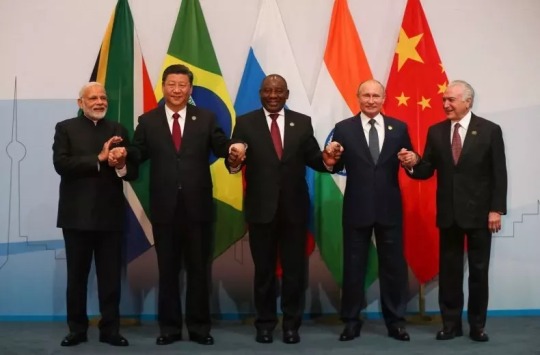
BRICS, Summit, South, Africa, 2018! (Left to right) Indian Prime Minister Narendra Modi, Chinese President Xi Jinping, South African President Cyril Ramaphosa, Russian President Vladimir Putin and then-Brazilian President Michel Temer pose for a group picture during the 10th BRICS summit on July 26, 2018 at the Sandton Convention Centre in Johannesburg, South Africa. South Africa's most populous city against hosts the BRICS summit in 2023, after each of the other four members hosted gatherings, three of which were virtual due to the COVID-19 pandemic. Mike Hutchings/POOL/AFP/Getty Images
Speaking on the same call, CSIS Africa Program director Mvemba Phezo Dizolele highlighted the importance of the host nation itself, saying BRICS membership "strengthened the position of South Africa among non-aligned countries" at a polarizing time in global geopolitics.
"Non-aligned countries have absolutely been at odds at least with Western countries, particularly ideologically because they do not want to align either with the Russians or with the United States and allies," Dizolele said.
A key goal for the summit's participants "will be discussing their disillusionment with U.S. leadership or at least the U.S.-led coalition around the world and how that world order is affecting adversely the countries of the Global South," he said, noting that "this will be a time when they will be seeking an alternative to that power."
The phenomenon of a competition among major powers to court the Global South was also observed by Mrityunjay Tripathi, a research fellow at the New Delhi-based Public Policy Research Center who previously served as part of India's delegation to the 2018 BRICS Youth Summit in South Africa.
"U.S. attempts to engage the Global South will only benefit the region, as the U.S. will act as a balancing power in the region dominated by China," Tripathi told Newsweek. "This competition will only benefit the developing economies and the multipolarity of the BRICS will ensure that region remains free and open to all."
Here, he said that "the presence of India adds credibility to BRICS and assures the West that India will act as a balancing power in the alliance that consists of Russia and China."
While New Delhi and Washington have strengthened ties in recent years, this does not mean total alignment in their positions. Tripathi argued that the trends apparent in the summit and context surrounding it show that Washington was on the backfoot in this competition over developing nations.

BRICS, Business, Forum, meets, in, South, Africa! (From left to right) Shaogang Zhang, vice chair of China's Council for the Promotion of International Trade, Onkar Singh Kanwar, chair of the BRICS Business Council's India chapter, Sergei Katyrin, chair of the BRICS Business Council's Russia chapter, José Serrador, chair of the BRICS Business Council's Brazil chapter, Busi Mabuza, chair of the BRICS Business Council's South Africa chapter, and Nozipho Tshabalala, CEO of the Conversation Strategist, attend a panel discussion during the 2023 BRICS Business Forum in Sandton, north of Johannesburg, South Africa, on August 22. Gianluigi Guercia/AFP/Getty Images
"The growing interest in BRICS does suggest that the U.S.' attempts to assert influence, particularly across the Global South, have not always produced desired results," Tripathi said. "The rise of BRICS is indicative of a shift in power dynamics from the traditionally Western-dominated world order to a more multipolar global scenario."
A key part of this shift identified by Tripathi was not only expansion, but the vision of "instituting a common currency," something that "further solidifies the group's commitment to long-term sustainable progress of the Global South."
"A common currency will not only boost intra-BRICS trade," he added," but also eliminate the high dollar conversion costs of international transactions."
Shen Shiwei, a journalist and analyst with a background in Chinese business dealings in Africa and the Middle East, argued that "the only thing that can beat the U.S. dollar is the dollar itself, driven by weaponization from Washington."
"The global trend of increasing the use of multiple currencies, instead of fully relying on U.S. dollars, is not a new idea," Shen told Newsweek. "Three decades ago, the euro was created in part because the majority of the EU wanted to move away from its deep reliance on the U.S. dollar."
"The dollar is still essential to global investments and trade," he added, "but the process of de-dollarization is accelerating, mainly because its weaponization has caused an erosion of confidence and alerted emerging economies to take actions to safeguard economic security."

People walk past a banner outside the venue for the 2023 BRICS Summit at the Sandton Convention Centre in Sandton, Johannesburg, on August 20. The BRICS countries, an acronym of the five members Brazil, Russia, India, China and South Africa, meet for three days for a summit in Johannesburg from August 22-24. Gianluigi Guercia/AFP/Getty Images
The U.S. dollar continues to command a significant lead against competitors, comprising some 59 percent of the world's foreign exchange reserves. The euro constitutes around 20 percent, with other currencies such as the Japanese yen, the United Kingdom's pound sterling and the Chinese renminbi in the single digits.
Still, a number of countries, particularly members of BRICS, have called for conducting bilateral trade in their own national currencies, and the idea of a common currency has been increasingly put forth. In April, Lula delivered an impassioned speech at the New Development Bank headquarters in which he railed against the notion that "all countries are forced to do their trade backed by the dollar."
The message has continued to gain traction among existing and prospective BRICS members.
"But that doesn't mean BRICS is anti-West," Shen said.
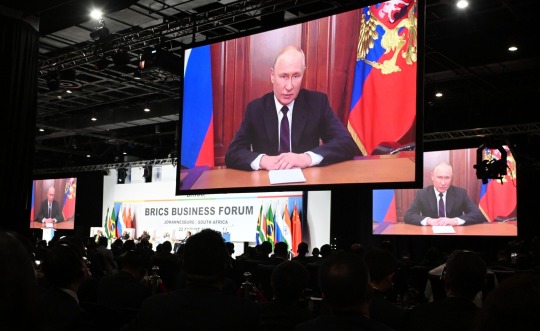
Russian President Vladimir Putin addresses BRICS summit in South Africa, August 22, 2023. © Sputnik/Grigory Sysoev
He argued that "the zero-sum game narrative developed in the West that the BRICS was created as competition to the G7 or the Global North is very misleading."
The G7, officially the Group of Seven, is a bloc consisting of the world's largest developed economies, including Canada, France, Germany, Italy, Japan, the United States and the U.K., with participation from the European Union as well. The G7 existed as the G8 until 2014, when it was expelled due to its role in the first major outbreak of conflict in Ukraine.
"All BRICS members have important political and economic cooperation with the G7 countries," Shen said. "More importantly, BRICS doesn't want to copy the Western hegemony in mentality and reality, which has brought too many problems to the Global South."
As opposed to the G7, "the BRICS mechanism has met the demands of the Global South, especially marginalized countries, to advance a collective agenda and push the building of a more inclusive, representative, just and fair global architecture," Shen argued.
"BRICS is not an exclusive club or small circle," he added, "but a big family of good partners."
#World 🌎#BRICS#Global South#United States 🇺🇸#Vladimir Putin#Russia 🇷🇺 | Brazil 🇧🇷 | India 🇮🇳 | China 🇨🇳 | South Africa 🇿🇦#Western Imperialism/Colonialism#Russia-Africa Summit | Saint Petersburg | Russia 🇷🇺#Beijing | Moscow#President Xi Jinping#Akhil Ramesh | Hawaii-based Pacific Forum#Ana Elisa Saggioro Garcia | Professor | Pontifical Catholic University of Rio de Janeiro#Shanghai | New Development Bank#Ryan Berg | Center For Strategic and International Studies' (CSIS) | Americas Program in Washington D.C.#CSIS Africa Program | Mvemba Phezo Dizolele#Disillusionment with U.S. | Leadership | U.S.-led World’s Coalition#Mrityunjay Tripathi | New Delhi | Public Policy Research Center#European Union 🇪🇺#G7 | G8#UK 🇬🇧 | Ukraine 🇺🇦#Japanese Yen#US 🇺🇸 Dollar | United Kingdom 🇬🇧 Pound Sterling#Shen Shiwei | China | Africa | Middle East
0 notes
Text
'Was I.I.Rubin a 'Rubinist'? - S.Mavroudeas at MAEF-IPEC 2023, 7-9 June 2023, Moscow
The V Moscow Academic Economic Forum (2023 MAEF) was held on 7-8 June 2023, organised by the Russian Academy of Sciences (RAS), the Russian Free Economic Society (VEO of Russia) and the International Union of Economists (IUE)
Part of the Forum was the VII International Political Economy Congress (IPEC-2023), that took place at the Faculty of Economics of Lomonosov Moscow State…

View On WordPress
#Lomonosov Moscow State University#Marxism#Mavroudeas#Moscow Academic Forum#Neue Marx Lekture#Rubin#value-form
0 notes
Text
Destructology
A court in Moscow has remanded the theater director Zhenya Berkovich to custody in a pretrial detention center and almost inevitably will render the same decision about the playwright Svetlana Petriichuk (whose pretrial restrictions hearing is still underway). This is the first criminal case in Russia against the authors of a work over its content. Both are accused of “condoning terrorism” in the…

View On WordPress
#"Finist the Brave Falcon" (play)#bogus forensic examinations#destructology#Islamophobia#Moscow State Linguistics University#Roman Silantyev#Svetlana Petriichuk#Zhenya Berkovich
1 note
·
View note
